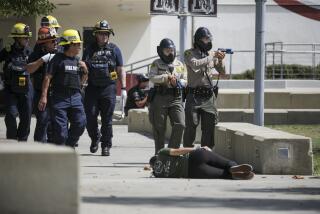Brown signs bills to aid veterans, boost community college costs
SAN DIEGO — Californians will be asked to make $600 million available to help struggling military veterans find housing under legislation Gov. Jerry Brown signed Thursday.
The governor also signed measures to allow community colleges to charge more for high-demand classes and permit job applicants to omit criminal histories when applying for positions at state and local government agencies. He vetoed a proposal to change the process for firing teachers.
Brown, a Democrat, signed the veterans housing bill — and several other measures intended to support the military — in this traditionally Republican city with a large military presence.
“I know some folks in this part of the state are a little skeptical about what we do up there in the state Capitol,” he said, surrounded by veterans and public officials. “But today, we’re doing something really good, and the people behind me are making it happen, for veterans, for families, for our future.”
Voters have approved $1.4 billion in bonds to help veterans buy homes since 2000, but most of that money remains untapped. Mortgage rates offered by the state haven’t been competitive, and the housing market has been weak.
The legislation Brown signed would make $600 million of the bond money available to instead finance other kinds of housing, such as low-cost apartment buildings and places where veterans can receive services counseling, job training and other offerings. The remaining bond money would still be available for mortgages.
The measure would cost the state $25 million a year, according a state Senate estimate, and is scheduled for the June ballot. If approved by voters, it would help veterans return to civilian life and get homeless veterans off the streets, said Assembly Speaker John A. Pérez (D-Los Angeles), author of the measure, AB 639.
“Veterans have devoted their lives to the protection of our country, and it is absolutely unacceptable when they cannot afford a place for them and their families to sleep,” Pérez said at the San Diego event.
Theresa Gunn, deputy secretary of the California Department of Veterans Affairs, said construction on new housing could begin late next year.
“This is a good step for veterans,” said Gunn, who will help oversee the new program. “We’re excited to get going.”
Brown signed a separate bill allowing counties to waive inspection and permit fees when disabled veterans make modifications to their homes (AB 151 by Republican Assemblywoman Kristin M. Olsen of Modesto). And he authorized $1 million for a new military cemetery along the central coast by signing SB 232 by Sen. Bill Monning (D-Carmel).
In addition, Brown accepted a bill allowing people seeking a job with a state or local government agency to leave a criminal history off their initial applications. Assemblyman Roger Dickinson (D-Sacramento) authored the measure, which requires public-sector employers to first consider an applicant’s job qualifications before obtaining a conviction history.
Jim Evans, a spokesman for Brown, said the governor signed the bill, AB 218, “so that millions of Californians seeking honest work won’t be automatically rejected.”
The measure was opposed by a number of government agencies and associations, including the League of California Cities, which said it would interfere with local officials’ ability to adequately and quickly vet job applicants.
Brown also signed legislation creating a pilot program that allows some community colleges to raise charges for high-demand classes during summer and winter terms. Proponents said it will help eliminate bottlenecks that keep many students from completing their course work.
Critics of that bill, AB 955 by Assembly member Das G. Williams (D-Santa Barbara), said it could hurt students who can’t afford the higher charges. But Brown disagreed, saying in a statement that it creates “a reasonable experiment.”
The governor vetoed a measure that supporters said would ease the process for dismissing public school teachers.
The measure, by Assemblywoman Joan Buchanan (D-Alamo), was backed by Supt. Tom Torlakson, the state schools chief, and by the powerful California Teachers Assn. They said the proposal would make it quicker and cheaper to fire teachers by limiting the appeal process to seven months.
But school districts and administrator groups protested that the compressed time frame would actually hobble a district’s ability to fire teachers by imposing an arbitrary limit on completion of cases.
In his veto message, Brown said the bill, AB 375, was too rigid and could create new problems. He urged the Legislature to continue working on the issue.
Times staff writers Melanie Mason and Carla Rivera contributed to this report.
More to Read
Sign up for Essential California
The most important California stories and recommendations in your inbox every morning.
You may occasionally receive promotional content from the Los Angeles Times.










